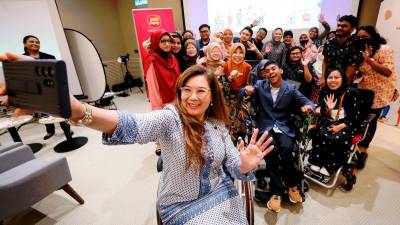PETALING JAYA: For Persatuan OKU Sentral president Datuk Dr Ras Adiba Radzi, the meaning of Merdeka goes beyond freedom from colonial rule.
To her, it means living in a Malaysia where persons with disabilities (PwD) are treated as equals and fully included in every aspect of national life.
“Merdeka really means that I, as a person with disability, am treated the same as everyone else who is able-bodied, not sidelined, not discriminated against, not facing double standards. It means living harmoniously, with accessible infrastructure and a society that accepts us as part of daily life,” she said.
Ras Adiba stressed that the real barriers do not lie within persons with disabilities, but within society itself.
“To be very honest, we’re not the ones who are disabled. The real disability lies in the infrastructure around us and the discrimination we face. When those barriers are removed, only then can we feel truly equal,” she explained.
She reminded Malaysians that persons with disabilities contribute to the nation just like everyone else, as taxpayers, workers, parents, athletes and active members of society.
“We only ask to be treated equally in the country that we love and will do anything for,” she said.
Reflecting on Merdeka celebrations, Ras Adiba acknowledged that efforts have been made to accommodate PwD but said there is still a long way to go.
“Usually, celebrations are held on the streets. Frontliners on duty often make sure we get to sit at the front. But we need more mindfulness from everyone, especially for wheelchair users or those who need to sit, to ensure we can truly be part of the festivities,” she said.
She underlined the importance of accessible infrastructure such as ramps and chairlifts, particularly in older buildings, noting that such facilities also benefit the elderly and others with mobility challenges.
Accessibility, she added, extends far beyond the physically disabled.
“Imagine being deaf at a celebration without sign language interpreters or being blind without narration. We need to ensure large screens include interpreters, that stages are accessible, and that there are designated areas for PwD and their helpers,” she said.
Malaysia, she acknowledged, has made progress in recent years, including greater visibility of sign language interpreters on news broadcasts.
Still, she called for stronger institutional commitment.
“I’ve pressed for sign language to be recognised as the third language, taught from primary school onwards.”
She also urged for public information and campaigns to be designed inclusively, with clear visuals, simple formats and narration or voice-overs for the blind.
Ras Adiba emphasised that inclusivity begins with awareness, urging Malaysians to work together instead of being confrontational when addressing accessibility gaps.
“It’s about creating understanding. Access is not just for the disabled, it’s for everyone: the elderly, the vulnerable, those with rare diseases, people with learning disabilities. Inclusivity benefits the whole of society,” she said.
